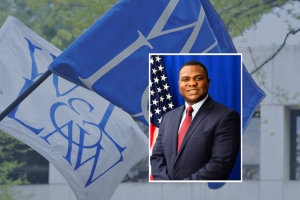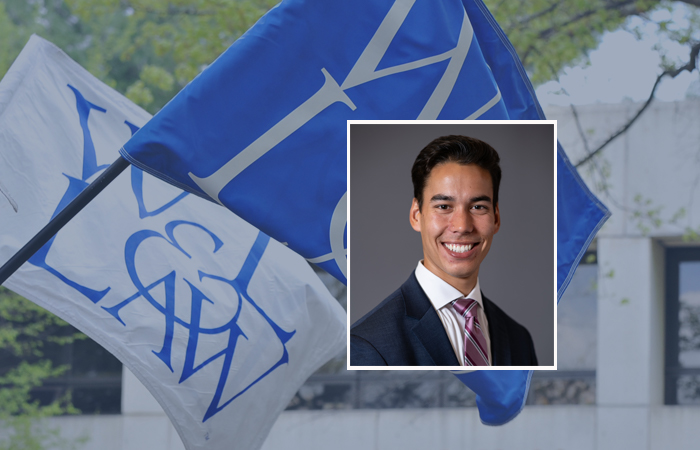
Alumni Spotlight: Ben Richie ’22L Ben Richie works for the U.S. Securities and Exchange Commission in the Division of Corporation Finance’s Disclosure Review Program.
Ben Richie ‘22L grew up in the Bay Area of California but has been living on the east coast since graduating high school and attending the Virginia Military Institute (VMI) in 2013. Following graduation from VMI, Ben moved to New York City where he joined Wachtell, Lipton, Rosen & Katz as a corporate paralegal for two years. At W&L Law, Ben worked as a Research Assistant to Professor Sarah Haan, assisting in a rewrite of the infamous White v. Panic opinion for The U.S. Feminist Judgments Project. He was also a Student Honors Intern with the U.S. Securities and Exchange Commission, where he currently works in the Division of Corporation Finance’s Disclosure Review Program. Outside of work, Ben enjoys sports, fitness, and trying new restaurants. This spring, he looks forward to coaching Capitol Hill Little League Baseball.
Did you know coming into law school that you wanted to work in the government?
I’ve always been interested in public service and working for the government in some capacity, and it was the driver behind my choice to attend VMI. However, I also really enjoyed my time in private practice before law school. Wachtell introduced me to corporate transactional law, where I learned to appreciate the teamwork, intensity, and excitement that go into high-value deal work. Because Wachtell has relatively few attorneys, I had the opportunity as a paralegal to work closely with every member of the deal teams from start to finish.
My law school experience affirmed my desire to keep a foot in both worlds. I had wonderful corporate law professors at W&L who showed me the global impact of capital markets and helped me understand the different perspectives surrounding the regulation of the field. During my 1L summer, I enjoyed researching and drafting a comment letter regarding a Department of Labor proposed rule. These academic experiences, with my firm experience, made me interested in the SEC. Working there satisfies my interest in securities regulation, deal work, and my draw to public service.
What have you learned in these first few months working for the SEC?
I feel very lucky to have been given the opportunity to join the SEC immediately after law school. To those in private practice, much of the SEC’s work is opaque and, in many cases, the value of more senior capital markets attorneys comes from knowledge of specific guidance from and a more accurate understanding of the likely interpretations of the Commission staff. In these first few months, I’ve learned to understand the rationale behind certain rules, how to review certain disclosures in light of recent or novel trends, and about the filing process, generally. These intangibles have been incredibly beneficial to my growth as a young capital markets attorney.
More generally, as is likely true among first year attorneys across practices, learning the details of the law of your specialty is imperative. In securities regulation, I’ve had to quickly get comfortable with how different rules, regulations, and staff-issued guidance interact. As an examiner, I’ll often need to refer to two or three different sources to determine what a single item of a form requires. As my understanding of the law improves, I’ve been able to turn my focus to the details of my Industry Office within the SEC. By learning industry group specifics, I’m able to memorize smaller, more impactful portions of the relevant law and how we expect registrants within the industry to prepare their information. Figuring out what works best for you, in terms of memorization and compartmentalization, is important for growth within a new job. Remember, nobody minds if you ask a question; they start to mind when you ask the same question twice.
How did you find your current job?
Government legal jobs tend not to follow the private practice convention of making full-time offers at the conclusion of 2L summer. Although I had worked for the SEC during my 2L summer, it was uncertain whether there would even be a full-time position available the following fall. I made an effort to cultivate a strong relationship with my supervisor during the summer and kept in touch with her throughout my 3L year. When the Disclosure Review Program posted an open full-time attorney position, she supported me throughout my navigation of the application process, which can be long and nerve-wracking, especially when your friends in private practice have had jobs secured for months. To put it in perspective, I didn’t have a job offer until two weeks before the bar exam.
Any current students who are interested in the SEC or practicing in Washington, D.C. should feel free to reach out to me with any questions. Those that are interested in government jobs, not just the SEC, should not only be looking at USAJobs but also the organization websites and social media.
What sort of legal issues do you handle on a day to day basis?
Generally speaking, I review reporting companies’ filings based on the form requirements to ensure that they have not included any untrue statements or omitted material facts that would clarify an otherwise misleading statement. I mostly review registration statements for private companies’ IPOs and will occasionally work on “de-SPAC” business combinations. We review these filings to protect investors and ensure that they have all necessary and available information when considering their investment. This means that for every filing, I determine the materiality threshold under the specific facts and circumstances and interpret the requirements of the relevant regulations for the given form.
What do you like about your current job?
My favorite part of the job is working with attorneys and accountants that genuinely enjoy their work and believe in the mission of the agency. Their unending dedication to public service and ensuring fair markets is humbling. From a legal perspective, the best parts of the job are discovering novel issues within a filing and discussing our response with my coworkers. For example, registrants or underwriters may attempt to find a creative way to decrease costs and liabilities by weakening certain investor protections. At times, the job can make you feel like an investigative reporter—reading between the lines and connecting different aspects of the disclosure.
Which W&L classes and/or experiences do you think were most helpful in preparing you for this job?
It shouldn’t surprise anyone that any of the corporate law classes offered in law school will ultimately be helpful if you end up practicing transactional or regulatory law. Securities Regulation was the most helpful in terms of the black letter law and familiarizing myself with the ’33 Act and some small business filings. Insider Trading also helped prepare me for some of the more critical thinking-focused aspects of the job around theories of liability.
If you know any W&L alumni who would be great profile subjects, tell us about them! Nominate them for a web profile.
Outside of Work
Hobby
Cooking
Book/Podcast Recommendation
The Sanatorium by Sarah Pearse
Favorite Travel Location
Deba, Spain
Something you miss about W&L Law
The ease of visiting everyone you care about. Whether it’s a 10 second walk or 10 minute drive, everyone is closer in Lexington – take advantage of it.
 Ben Richie ’22L
Ben Richie ’22L
You must be logged in to post a comment.